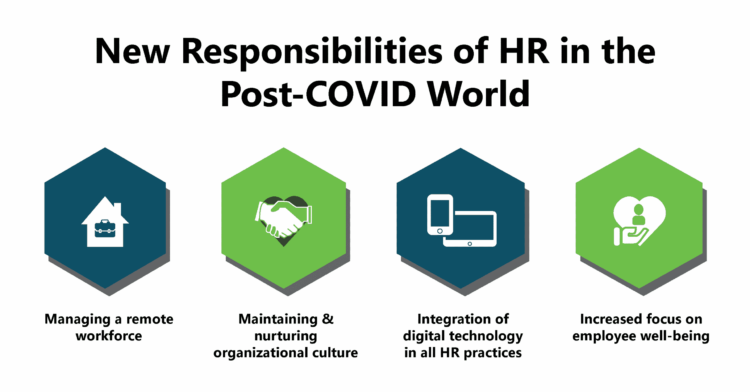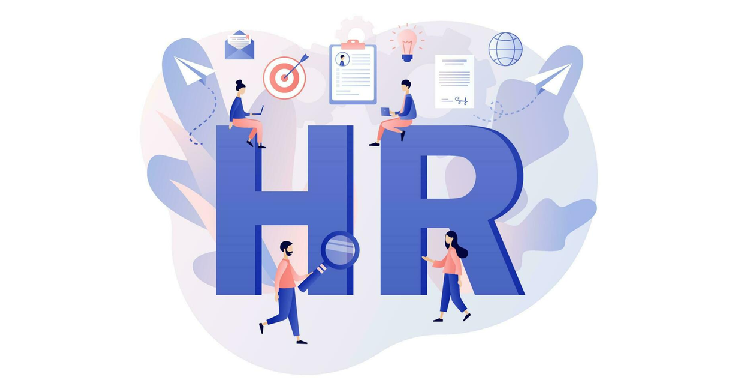Reimagining HR for the post-COVID era — a strategic blueprint for navigating hybrid workforces, digital transformation, and employee wellbeing in the new normal.
1. Following the COVID-19 pandemic, HR’s role will focus heavily on managing a remote workforce, necessitating new policies for all stages of the employee life cycle.
2. HR must maintain and nurture a cohesive organizational culture, even with a dispersed workforce, to ensure employee engagement and effective communication.
3. Integrating digital technology into HR practices will accelerate, making processes more efficient and transparent.
4. There will be an increased focus on employee well-being, addressing physical and mental health, especially for remote workers.
Over the last decade, HR’s role has increasingly aligned with organizations’ business goals. The COVID-19 Pandemic will likely profoundly impact how organizations operate, reshaping the role of HR in the post-COVID-19 workplace.

During the COVID pandemic, HR teams have played a key role as the frontline responders in this time of crisis.
They have been responsible for responding quickly to ensure the continuity of people operations.

With organizations forced to make changes overnight, HR teams have been working tirelessly to guide employees through this phase.
Experts feel that post-COVID-19, the role of HR is all set to change.
They must focus on maximizing sustainability and growth in the changing business environment.
The COVID-19 pandemic has had a profound impact on how organizations operate and on the personal and professional lives of their employees.
This impact will be long-lasting. Hence, post-COVID-19, the role of HR in managing the workforce is set to change.
1. Managing a remote workforce
2. Maintaining and nurturing an organizational culture
3. Integration of digital technology in all HR practices
4. Increased focus on employee well-being


One of the most significant outcomes of the current crisis is the ability for employees to work remotely.
Even after the crisis, a significant portion of the workforce may continue to work remotely, given the benefits.
Hence, HR needs to come up with new policies for hiring, onboarding, compensation, benefits, management, communication, and recognition of exits.
Organizations should remap the entire employee life cycle to accommodate remote work arrangements.
It can be challenging, as some employees might work from the office while others will continue working from home.
Others might switch between the two modes to balance their business and personal needs.

As organizations allow remote work, they will also need to accept a dispersed workforce.
It, in turn, will create a challenge in establishing a common organizational culture, which is critical for long-term business success.
Hence, the HR will need to focus on developing effective policies to ensure employee engagement, regular communication with remote employees, and sustain the organization’s culture.
The challenge of developing and sustaining the organizational culture will be more significant as employees working together may seldom meet.

Additionally, implementing every HR policy will likely rely extensively on digital technology.
Digitization has been an ongoing initiative in HR processes for some time now.
However, this crisis has necessitated that such initiatives pick up steam and there is complete digitization of all HR processes.
So, from learning and development to team management, digital tools will help make processes more straightforward, effective, and transparent.
Hence, HR professionals must prepare to integrate digital technologies into their HR processes.

Another critical responsibility for HR post-COVID-19 is to ensure the physical and mental well-being of all employees.
HR must ensure employees working from home do not feel disconnected from the organization.
They need to ensure that their engagement levels are not diminished due to their sense of isolation.
Additionally, HR should prioritize remote employees’ physical well-being through online fitness sessions led by fitness coaches.
They can facilitate the mental well-being of remote workers through online counselors and helplines.

HR’s role will increasingly involve managing remote workforces, redesigning policies across the employee lifecycle for distributed teams, and adapting to flexible work models.
With remote or hybrid teams, maintaining a cohesive culture becomes more challenging. HR needed to ensure continuous communication, engagement, and culture reinforcement across dispersed employees.
Because HR processes—from hiring to learning to recognition—must be fully digitized to remain effective, transparent, and scalable in a remote or hybrid environment.
Employee well-being (both physical and mental) has become a priority. HR needs to design wellness programs, provide counseling support, and implement measures to reduce isolation among remote workers.
HR must revisit its policies for onboarding, compensation, benefits, performance management, communication, and exits to ensure they are compatible with remote or hybrid work arrangements.
Some employees may always work remotely, others will always be in the office, or toggle between both. HR must reconcile the differences and ensure consistent experiences and policies across modes.
The COVID-19 crisis has changed the way organizations and employees work significantly. The post-COVID world for HR professionals is likely to see new challenges. This would require fresh thinking, new approaches, and significant learning to keep pace with these changes in the workplace.

Lead author: Sagar Chaudhuri, the Co-Founder and CEO of HiFives. He is an HR Tech Evangelist with over 25 years of experience in both corporate and entrepreneurial settings. Previously, Sagar has held leadership roles with companies such as Genpact, Infosys, and ICICI Bank. He has an engineering degree from IIT Kharagpur and an MBA from IIM Lucknow. Connect on LinkedIn
To stay updated on the latest HiFives blogs, follow us on Twitter (@MyHiFives)